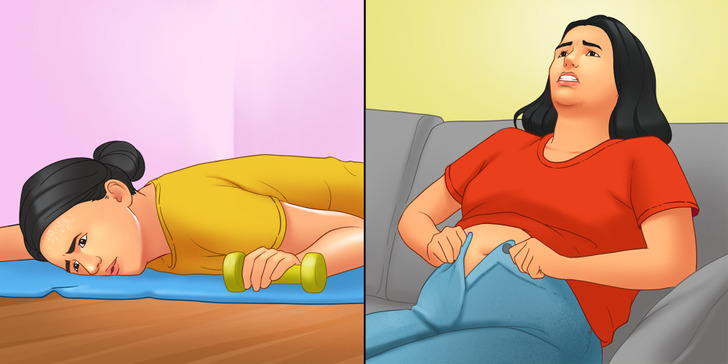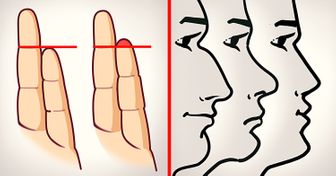Easy Cash Making System Which can makes you able to earn about $12k or more just by work simply using your Mobile, .........


Weight loss can be challenging. And if you are reading a lot about it online, it can also be confusing. There are a lot of sites and blogs full of health and weight loss tips, and so many seem legit. While it is always important to talk to a doctor or nutritionist, sometimes just a quick double-check brings these things to a whole new light.
Today at Bright Side, we decided to give some common “healthy habits” a check. And some results were really surprising. Check it out.
Working out in the morning is considered a great option. It matches the body’s natural hormone fluctuations, helps with focus and mood throughout the day, and helps regulate the appetite. However, if you compromise the ideal number of hours you should be sleeping, it can backfire. Sleep restrictions are linked with increased hunger and food intake, with higher risks of weight gain and obesity.

To really make a difference in your life, a regular workout plan should definitely be something as routine for you as eating or sleeping. But you should always reserve one day to rest every 7 to 10 days. This is because the body needs to repair microscopic tears in muscle tissue and rebalance lactic acid and glycogen levels. This gives you time for your muscles to grow stronger and decrease the risk of injury.
Working out too much can cause adrenal fatigue and actually increase weight gain, especially around the belly. That’s on the account of cortisol, a natural stress hormone that’s responsible for regulating your metabolism. Here’s a pro tip: cortisol is also directly related to stress, so make sure to rest enough, both physically and mentally!

We might be more used to hearing the opposite, but this is also true. Just as not enough sleep is bad for you, too much sleep also increases the risk of developing chronic diseases, like coronary heart disease, diabetes, anxiety, and obesity in adults. If you feel that 7 to 8 hours of sleep per night are “not enough,” or you find yourself feeling tired after a night of good sleep, consider checking in with your doctor.

This is in reference to healthy fats, of course. Fats have gained a bad rap, but they are part of a balanced healthy diet, and our bodies need them. They help absorb vitamins, support cell growth, brain and eye health, healing, and hormone production, just to name a few. And they are the best source of energy for our bodies.
If you’ve been feeling sluggish, are hungry often, your joints ache, or you’re getting more colds than usual, you might want to eat more healthy fats. This can be found in cheese and eggs, olive butter or canola oil, nuts and avocados, and chia or flax seeds. Just try to avoid trans fats from hydrogenated oils that are often found in processed foods.

From decreasing the risk of diabetes and aging slower to sleeping better and losing weight, the benefits of cutting down on sugar are immense. However, a zero-tolerance of sugar might lead to adding in food with artificial sweeteners, and these products can be as bad as sugar itself, driving diabetes and obesity.
Sugar can be part of a balanced diet, just choose whole fruits instead of juice or cookies. That way, you’ll also be consuming the natural fibers that help the body make the best use of it.
Eggs are among the most nutritious foods on the planet. They have a lot of vitamins and almost a bit of every nutrient our bodies need. But when you ditch the yolk, you’re throwing away more than half of the nutrients. And what’s more, the yolk is where the choline is, a rare nutrient that is used to build cell membranes and plays a specific role in the brain.
The fat the whole egg provides is beneficial — so much so that it’s linked to reducing the risk of heart disease and raising “good” cholesterol.

Salads are great, but if you’re filling your stomach with lettuce, you might not be leaving enough room for the right amount of protein. Protein plays a role in the creation and maintenance of every cell in the body. Without it, we might lose muscle mass and get weaker immune systems, hair, and nails.
Also, you’ll probably feel less satisfied after low protein meals and be hungrier often. High-protein diets are associated with a more boosted metabolism and a reduction in calorie intake and cravings.
Eating yogurt is considered a healthy habit, as it’s packed with health benefits. It contains calcium, probiotics that are good for our microbiome and immune system, vitamins, protein, you name it. However, most flavored yogurts we buy have a lot of added sugars and sweeteners. So, if you really love yogurt with fruit, think about adding your own to a more natural yogurt.

Water makes up the majority of our body weight and it is vital for us. While not drinking enough water might compromise our health, drinking too much can lead to overhydration and weight gain. Overhydration can be very serious. It occurs when the amount of salt and other electrolytes in your body becomes too diluted, compromising the body’s regular functions.
Also, constantly drinking water lowers sodium levels in the blood, which can cause the body’s cells to swell, brain cells included! And if the kidneys aren’t able to keep up, you’ll get what’s called “water weight” as it accumulates. If you’ve recently changed your habits and have felt nausea, headaches, or are confused and disorientated, you might want to check this out with your doctor.
Do you work out regularly? Long stairs and “dog-runs” included! And do you love yogurt? What type? Let us know in the comments!
Easy Cash Making System Which can makes you able to earn about $12k or more just by work simply using your Mobile, .........












